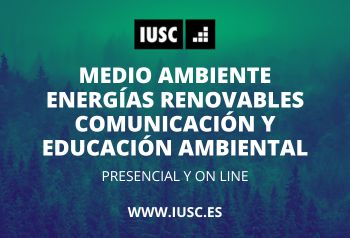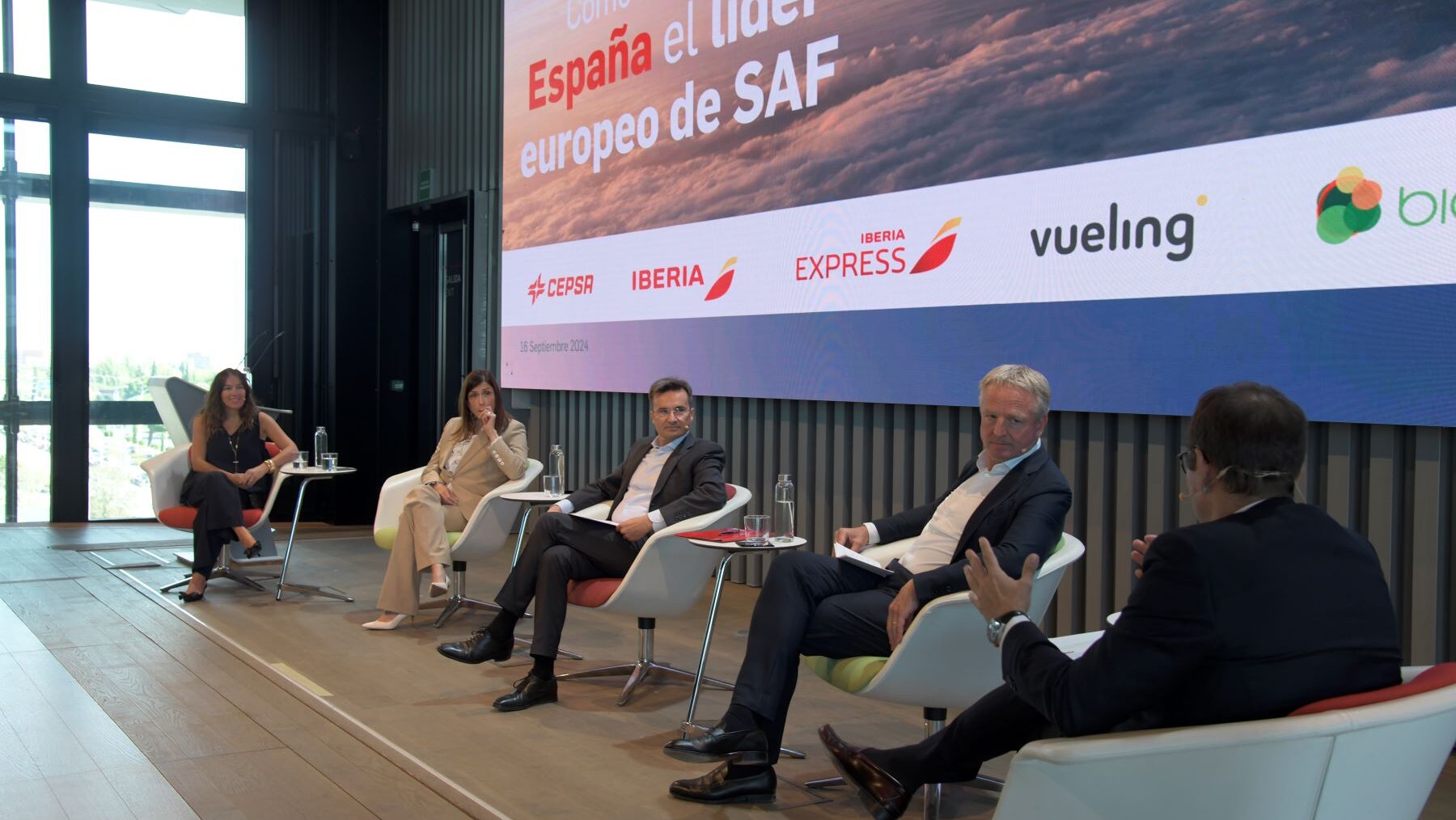The presentation of the report entitled ‘How to make Spain the European leader SAF? This sets the roadmap that will enable the acceleration of air transport decarbonisation.
Cepsa, Iberia, Iberia Express, Vueling and BIOCIRC (Spanish Association for Biocircularity) have report with 16 economic, regulatory and public-private partnership measures promoting the production and consumption of sustainable aviation fuels (SAF) – an alternative that allows to reduce the environmental impact of the aviation sector by reducing CO2 emissions – to position Spain as the European leader in this new technology and sustainable tourism.
The conditions available in Spain for The production of SAF represents a great opportunity for the national economy. For this reason, the four entities propose to develop the SAF a country project that positions Spain as a European hub and plays a pioneering role in the field of sustainable tourism and the energy transition.
The report ‘How to make Spain the European leader SAF? Roadmap to accelerate the decarbonisation of air transport’ recalls that the new industry that will produce this sustainable fuel will require an investment of €22 billion for the construction of facilities and the generate 270,000 direct, indirect and derived jobs by 2050.
The enormous impact of the SAF industry
The development of this industry could therefore have an impact 13,000 million euros to Spanish GDP, solely due to the construction of the factoriesto which another 42.851 million euros would be added for its operation until 2050 (in addition to the investments and jobs associated with this phase).


The report highlights the need to establish a regulatory framework that provides security to the actors involved, allowing them to invest with confidence in this emerging industry. The importance of jointly taking on the necessary investments and the increase in costs is also emphasized, so that the SAF is a sustainable and feasible solution in the short termas its price is three to five times higher than that of kerosene of fossil origin.
So is the development of innovative technologies for its productionas well as the deployment of industrial facilities with sufficient capacity to meet demand SAFis essential to take advantage of the potential of the raw materials available on the national territory.
The study points out that although the announced production capacity of SAF Today’s most widely used technology, HEFA, could meet 2030 needs, but it would fall far short of 2040 demand and the needs of e-SAF synthetic fuels (obtained from green hydrogen).
Nasty ensure energy independence and decarbonization of the aviation sector in Spain and access to aviation fuels until 2050 would require the construction of 3 HEFA biofuel plants, 5 synthetic fuel plants and at least 24 biofuel plants SAF AtJ (Alcohol to Jet) and FT (Fischer Tropsch).
The report also emphasizes the importance of locate SAF production plants close to raw materialsand contributes not only to the decarbonization of the economy, but also to the social and economic development of rural areas.
That’s why it’s essential to have one legal framework that facilitates the necessary investmentsin addition to encouraging the development of new technologies for the production of SAFkeys to achieving the post-2030 goals.
The presentation was attended by Rosario Sánchez Grau, Secretary of State for Tourism, who highlighted as one of our biggest challenges that the promoting sustainable and competitive energy so that companies can focus all their efforts on promoting decarbonization and competitiveness.
“Spanish industrial policy, which also includes tourism, needs more than ever make progress in decarbonizing the economy and undertake an energy and sustainable transition as a basis for the economic growth of our country,” Sánchez emphasized.
For Maarten Wetselaar, CEO of Cepsa, “the development of SAF is the key lever for decarbonizing the aviation sector, but at the same time it can be generate a new Spanish industry that promotes economic growthjob creation and greater energy independence.
At Cepsa, we are pleased to jointly propose, together with Iberia, Iberia Express, Vueling and BIOCIRC, measures that will make Spain a European hub of the SAF and a benchmark for sustainable air mobility. There is a global race to position itself in this new market, and that is why we must accelerate the implementation of all necessary measures so that Spain does not lose this opportunity.”
Marco Sansavini, President and CEO of Iberia, emphasizes that “we cannot miss this great opportunity for the country. We call on central government and the rest of the government services to do this join forces for a national SAF strategy.
We believe that it is time for the government to implement good policies of incentive measures, as it already successfully did with green hydrogen. “We are faced with the perfect opportunity to promote Spain’s reindustrialization, create jobs and prosperity and decarbonize a sector as difficult as aviation.”
For her part, Carolina Martinoli, president and CEO of Vueling, points out: “We must appreciate the role that the transport sector plays. aviation in terms of connectivity, integration and accessibility to multiple destinations; in addition to its social contribution and impact on the economy and employment.
Therefore, The SAF is an important tool in decarbonizing this sector. But we need incentives to create a more competitive environment where production can be scaled and costs reduced.”
Margarita de Gregorio, CEO of BIOCIRC, concludes that “the message we are sending today is unequivocal: Spain can be a leader in the production of SAF. Loose ambitious European goals of REFuelEU Aviation They open an opportunity for a country like ours, where so many renewable resources (both biomass and energy) can be produced SAF in our areas and a large scientific-technical and industrial capacity.
The added value could not be more strategic as it involves industrialization, replacing fossil jet fuels with renewable fuels and tackle the demographic challenge. And also inclusive, as all actors involved in the value chain can participate, from the primary and secondary sectors to public and private actors, and at all levels: national, regional, regional and local.
We urgently need a framework strategy for the country that sets out the regulatory, political and incentive scenario that will facilitate the viability of the projects. We are not talking about the future, but about the most immediate present.”.
The report emphasizes the importance of coordinating agreements between the different actors that make up the value chain, including governments ensure sustainable development of this industry.
For this reason, it calls for the streamlining of permits and authorizations, the development of airport infrastructure and the creation of a European SAF traceability mechanism. Also mentioned are the difficulties in accessing the different types of waste used as necessary raw materials, due to their wide distribution, and the lack of a centralized organization that facilitates their management, as well as the lack of incentives or obligations that support this effort.
Fund of more than 300 million euros per year to stimulate SAF consumption
One of the proposed measures is the creation of a fund of more than 300 million euros annually to finance the development of production facilities and encourage its consumption, using the revenues the state obtains through auctions of emission allowances.
The report predicts that the establishment of SAF in Spain under the current roadmap will entail an additional cost of EUR 5,045 million in 2040, which will gradually increase from EUR 68 million in 2025 to EUR 678 million in 2030. If these additional costs not be avoided by measures such as the presented roadmapshould be adopted by the aviation sector and end users.
In Spain, a third of the NextGen funds (over €70 billion) have been allocated to the “Green Deal”However, no allocation has been allocated to decarbonizing the aviation sector or the SAF industry.
Similarly, the report includes a series of accompanying measures that address the drive across the value chain to establish a strategy for this holistic support, including economic, fiscal, regulatory and transversal measures.
The companies promoting the report ask the government a national pact for the country opportunities that the SAF representswhich should become reality in a national strategy that makes this new energy vector the priority of energy and industrial policy in Spain.
International commitment to the SAF to accelerate decarbonisation of the aviation sector
Loose New renewable fuels play a key role in achieving the objectives of the Fit for 55 packagethat the European Commission has set out to reduce greenhouse gases by 55% by 2030 (compared to 1990) and achieve climate neutrality by 2050. The package includes initiatives such as ReFuelEU Aviationin which aviation fuel must necessarily be included SAF gradually, from 2% from next year to 70% in 2050.
The IATAthe International Air Transport Association, considers the SAF essential for the sector to achieve its sustainability goals. By 2016, only 500 flights had tested its use SAFand for By 2025, it is expected that there will be one million flights using this sustainable fuel.
He SAF makes it possible to reduce CO2 emissions by more than 80% regarding the consumption of conventional kerosene (taking into account the entire life cycle, from production to consumption). In this sense, according to the report, it is estimated that the emissions of CO2 The aviation sector in Spain could be reduced by 14 million tons by 2050, which would promote the energy transition and the circular economy, due to the use of waste that would otherwise end up in landfills.
Spain has the options to lead production SAFbut other countries such as Germany, the United Kingdom or the United States are firmly committed to the development of this new energy vector.
In fact, all of them have initiated action through economic and regulatory incentives so far set more ambitious SAF delivery targetswhich goes far beyond what is laid down in European regulations. Spain could fall behind in a market that will be global. Therefore, institutional support is needed to lead this sector.
The Decarbonizing aviation is a necessary step to ensure that the country reaches a level of sustainable mobility in accordance with the expectations and instructions of the European Union. And the SAF can be of great help in this regard.

